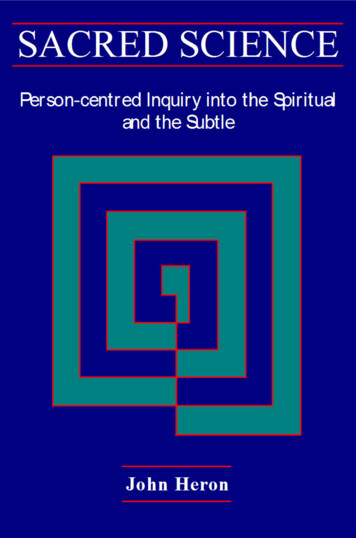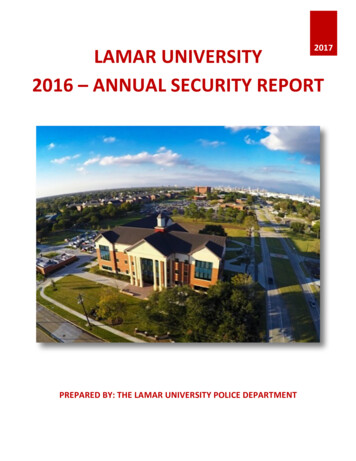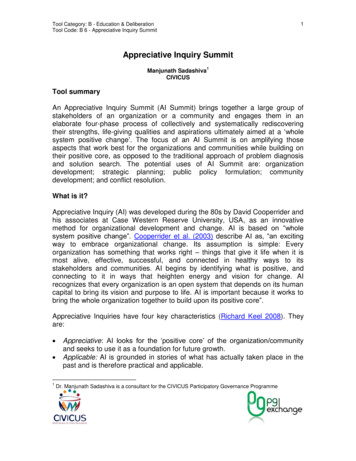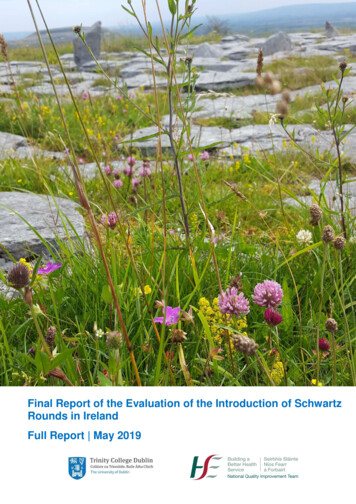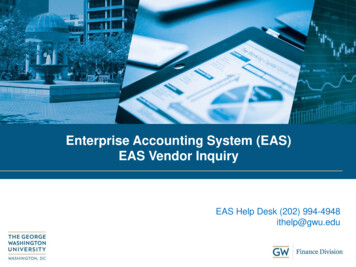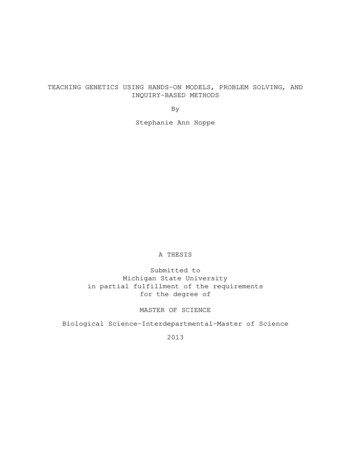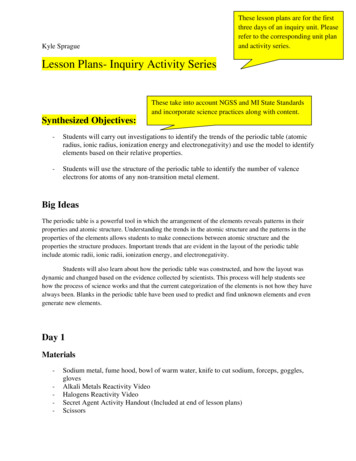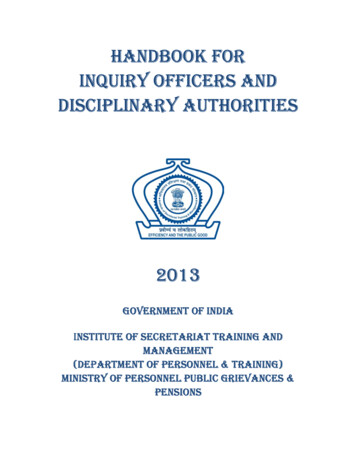
Transcription
HANDBOOK FORINQUIRY OFFICERS ANDDISCIPLINARY AUTHORITIES2013GOVERNMENT OF INDIAINSTITUTE OF SECRETARIAT TRAINING ANDMANAGEMENT(DEPARTMENT OF PERSONNEL & TRAINING)MINISTRY OF PERSONNEL PUBLIC GRIEVANCES &PENSIONS
ftfilClIi.'lq INSTITUTE OF SECRETARIATTRAINING & MANAGEMENT T , q R Umesh KumarMINISTRY OF PERSONNEL, PUBLIC GRIEVANCES & PENSIONS'qffif Director mm (GOVERNMENT ,AdministrativeTei.: 26185308, 26185309Telefax: 261 041 83 .1:A. . OF INDIA)( )Block, J.N.U Campus (Old) -110067www.istm.gov.inFOREWORDIn pursuance of the recommendations of the Committee of Expertswhich was set up to review the procedure of Disciplinary/VigilanceInquiries, the Department of Personnel and Training (DOPT) had directedthe Institute of Secretariat Training and Management to bring out anupdated Handbook for Inquiry Officers and Disciplinary Authorities.Shri Sethu Ramalingam an Ex-Faculty of ISTM in vigilance matters whowas entrusted with this work submitted the draft of the handbook well intime. Though every care has been taken to ensure the accuracy andcorrectness of the contents in the handbook, yet, in case the readers comeacross any errors or omissions, they may kindly bring the same to thenotice of this Institute. Any comments or suggestions for the improvementof this handbook will be gratefully appreciated.2.I am very happy to place 'this handbook in the hands of varioususers and readers. This Institute is thankful to the consultant andconcerned divisions of DOPT for guiding the process of preparation of thehandbook.fA (Umesh Kumar)DirectorNew DelhiDate: 25.09.2013---
HANDBOOK FORINQUIRY OFFICERS AND .25.26.27.28.29.30.31.32.TITLEDisciplinary Proceedings: Context and OverviewRole of Disciplinary AuthoritiesConstitutional Provisions Relating to Disciplinary ProceedingsPrinciples of Natural JusticeScope and Extent of Applicability of CCA RulesHandling ComplaintsPreliminary InvestigationAction on Investigation ReportConsultation with Central Vigilance CommissionSuspensionMinor Penalty ProceedingsDrafting and Issue of Charge SheetAppointment of Inquiring Authority and Presenting OfficerFunctions of Inquiry OfficerRole and Functions of the Presenting OfficerDefence AssistantConduct of InquiryBrief of the Presenting OfficerEvaluation of EvidenceEx-Parte InquiryPost Retirement ProceedingsCommon ProceedingsBorrowed and Lent OfficersReport of Inquiring AuthorityAction on Inquiry ReportConsultation with the UPSCQuantum of PenaltySpeaking OrdersAppeal, Revision and ReviewAction on Receipt of Court OrdersScope of Judicial ScrutinySample FormsPage -138139-143144 190191-200201-204205-213214-239
CHAPTER – 1DISCIPLINARY PROCEEDINGS:CONTEXT AND OVERVIEW1.Human resource is perhaps the most valuable asset of anyorganisation. It is the human resource which exploits other resources in theorganisation so as to achieve the organisational objectives. The aim of theHuman Resource Department, by whatever name it is known such asPersonnel Department, P&IR, etc, is to get the best out of the humanresource of the organisation. For achievement of this purpose, there are manysub-systems in the Human Resource Department such as GrievanceHandling, Counseling, Performance Appraisal, Career Planning, Training &Development, etc. Reward and Punishment system is one of the sub-systemsunder the Human Resource System. It is essential that every organisation,whether government or semi-government or private, should have a wellestablished reward and punishment system to ensure that the people aremade to work towards the fulfillment of the organisational goals. While thereward system will encourage the employees to work better towards theachievement of organisational goals, punishment system is used to preventpeople from working against the organisational goals.2.Misconduct, or non-conforming behaviour, as it is sometimes called,can be tackled in many ways such as counseling, warning, etc. In extremecases such as, criminal breach of trust, theft, fraud, etc. the employer is alsoat liberty to initiate action against the employee, if the misconduct of the latterfalls within the purview of the penal provisions of the law of the land. Howeversuch proceedings generally conducted by the State agencies, are timeconsuming and call for a high degree of proof. In addition to the above option,the employer also has an option to deal with the erring employee within theterms of employment. In such an eventuality, the employee may be awardedany penalty which may vary from the communication of displeasure, to theseverance of the employer-employee relationship i.e. dismissal from service.Disciplinary authorities play a vital role in this context. Efficiency of thedisciplinary authorities is an essential pre-requisite for the effective functioningof the reward and punishment function, more specifically the latter half of it.3.There was a time when the employer was virtually free to hire and firethe employees. Over a period of time, this common law notion has gone.Today an employer can inflict punishment on an employee only after followingsome statutory provisions depending upon the nature of the organisation.Briefly, the various statutory provisions which govern the actions of differenttypes of organisation are as under:(a)Government: Part XIV of the Constitution relates to the terms ofemployment in respect of persons appointed in connection with theaffairs of the State. Any action against the employees of the UnionGovernment and the State Governments should conform to theseConstitutional provisions, which confer certain protections on the1
Government servants. These provisions are applicable only to theemployees of the various Ministries, Departments and Attached andSubordinate Offices. Further, the employees, being citizens of thecountry also enjoy Fundamental Rights guaranteed under Part III of theConstitution and can enforce them though the Writ jurisdiction of theCourts. In addition to the constitutional provisions, there are certainrules which are applicable to the conduct of the proceedings for takingaction against the erring employees. Central Civil Services(Classification, Control, and Appeal) Rules 1965 cover a vast majorityof the Central Government employees. Besides, there are also severalother Rules which are applicable to various sections of the employeesin a number of services.(b)Semi Governmental Organisations: By this, we mean the PublicSector Undertakings and Autonomous Bodies and Societies controlledby the Government. Provisions of Part XIV of the Constitution do notapply to the employees of these Organisations. However, as theseorganisations can be brought within the definition of the term ‘State’ ascontained in Article 12 of the Constitution, the employees of theseorganisations are protected against the violation of their FundamentalRights by the orders of their employer. The action of the employer canbe challenged by the employees of these organisations on the groundsof arbitrariness, etc. These organisations also have their own sets ofrules for processing the cases for conducting the disciplinaryproceedings against their employees.(c)Purely private organisations: These are governed by the variousindustrial and labour laws of the country and the approved standingorders applicable for the establishment.4.Although the CCS (CCA) Rules 1965 apply only to a limited number ofemployees in the Government, essentially these are the codification of thePrinciples of Natural Justice, which are required to be followed in any quasijudicial proceedings. Even the Constitutional protections which are containedin Part XIV of the Constitution are the codification of the above Principles.Hence, the procedures which are followed in most of the Government andsemi-governmental organisations are more or less similar. This handout ispredominantly based on the CCS (CCA) Rules 1965.5.Complexity of the statutory provisions, significance of the stakesinvolved, high proportion and frequency of the affected employees seekingjudicial intervention, high percentage of the cases being subjected to judicialscrutiny, huge volume of case law on the subject - are some of the features ofthis subject. These, among others have sparked the need for a readyreference material on the subject. Hence this handbook.2
CHAPTER – 2ROLE OF DISCIPLILNARY AUTHORITIES1. Who is Disciplinary Authority?The term Disciplinary Authorities refers to such authorities who have beenentrusted with powers to impose any penalty on the employees. In respect ofthe organizations falling under the purview of CCS (CCA) Rules 1965, theterm Disciplinary Authority is defined in Rule 2 (g) of the CCA Rules as theauthority competent to impose on a government servant any of the penaltiesspecified in Rule 11. In this Handbook, CCS (CCA) Rules 1965 is henceforthreferred to as “the Rules”Disciplinary authority is defined with reference to the post held by theemployee. Various Disciplinary authorities are specified in Rule 12 of theRules. Thus there may be more than one disciplinary authority in everyorganization.2. What are the kinds of Disciplinary Authorities?Normally, there are two categories of Disciplinary Authorities viz. those whocan impose all penalties on the employees and the authorities who canimpose only minor penalties.3. What are the powers and responsibilities of the Disciplinary Authorities?Although it is not explicitly stated anywhere, main responsibility of theDisciplinary Authority is to ensure discipline in the organization. Towards this,the disciplinary authorities are required to identify acts of indiscipline and takeappropriate remedial action such as counseling, cautioning, admonition,imposition of penalties, criminal prosecution, etc.3
4. What is the relationship between Appointing Authority and DisciplinaryAuthority?Appointing Authorities are empowered to impose major penalties. It may berecalled that Article 311 clause (1) provides that no one can be dismissed orremoved from service by an authority subordinate to the Authority whichappointed him. In fact under most of the situations, the powers for imposingmajor penalties are generally entrusted to the Appointing Authorities. ThusAppointing Authorities happen to be disciplinary authorities. However theremay be other authorities who may be empowered only to impose minorpenalties. Such authorities are often referred to as lower disciplinaryauthorities for the sake of convenience.In this handbook, the term Disciplinary Authority has been used to signify anyauthority who has been empowered to impose penalty. Thereby the termincludes appointing authorities also.5. How to decide the Appointing Authority, when a person acquires severalappointments in the course of his/her career?CCA Rule 2(a) lays down the procedure for determining the AppointingAuthority in respect of a person by considering four authorities. Besides, itmust also be borne in mind that Appointing Authority goes by factum and notby rule. i.e. where an employee has been actually appointed by an authorityhigher than the one empowered to make such appointment as per the rules,the former shall be taken as the Appointing Authority in respect of suchemployee.6. What should be the over-all approach of the Disciplinary Authority?Disciplinary authorities are expected to act like a Hot Stove, which has thefollowing characteristics: Advance warning – One may feel the radiated heat while approaching theHot stove. Similarly, the Disciplinary Authority should also keep theemployees informed of the expected behavior and the consequences ofdeviant behavior. Consistency: Hot stove always, without exception, burns those who touchit. Similarly, the disciplinary authority should also be consistent inapproach. Taking a casual and lenient view during one point of time andhaving rigid and strict spell later is not fair for a Disciplinary Authority4
Impersonal: Hot stove treats all alike. It does not show any favouritism orspare anybody. Similarly, the disciplinary authority should treat allemployees alike without any discrimination. [You may feel that past goodconduct of the delinquent employee is taken into account while decidingthe quantum of penalty. This is not in contravention of the rule ofimpersonal approach. Even past conduct has to be taken into account inrespect of all the employees, without discrimination.] Immediate action: Just as the hot stove burns the fingers of those whotouch it without any time lag, the disciplinary authority is also expected toimpose penalty without delay. This will make the delinquent employee linkthe misconduct to the penalty; besides it also sends a message thatmisconduct will be appropriately dealt with.[The rule is attributed to Douglas McGregor who is better known for his ‘X’ and ‘Y’theories of Management]7. How to find out who is the Disciplinary Authority?Firstly, it must be remembered that the Disciplinary authority is determinedwith reference to the employee proceeded against. Schedule to the Rules1965 lay down the details of the disciplinary authorities in respect of variousgrade of employees in different services in the Government. The President,the Appointing Authority, the Authority specified in the Schedule ot the Rules(to the extent specified therein) or by any other authority empowered in thisbehalf by any general or special order of the President may impose any fo thePenalties specified in Rule 11.Appointing Authority as mentioned in the Schedule must be understood withreference to rule2 (a) of the Rules. The question as to who is the appropriatedisciplinary authority must be raised and answered not only while issuingcharge sheet but also at the time of imposing penalty because there mighthave been some change in the situation due to delegation of powers, etc. inthe organization.8. What are the functions of the Disciplinary Authority?Disciplinary authority is required to discharge the following functions:(a) Examination of the complaints received against the employees(b) Deciding as to who is to be appointed as the investigating authority5
(c) Taking a view as to whether there is any need to keep the delinquentemployee under suspension(d) Taking a view on the preliminary investigation report and deciding aboutthe future course of action thereon, such as warning, training, counseling,initiation of major or minor penalty proceeding, prosecution, dischargesimpliciter, etc.(e) Consultation with the Central Vigilance Commission (CVC) wherenecessary(f) Deciding whether there is any need to issue of charge sheet or penaltymay be imposed dispensing with inquiry under the appropriate provision(g) Issue of charge sheet where necessary - Rule 14(3)(h) In the case of minor penalty proceedings, deciding, either suo motu orbased on the request of the delinquent employee, as to whether it isnecessary to conduct a detailed oral hearing.(i) In the case of minor penalty proceedings, forming tentative opinion aboutthe quantum of penalty based on the representation of the delinquentemployee, if any, and ordering for a detailed oral hearing wherenecessary.(j) After issue of charge sheet, deciding as to whether there is any need toconduct inquiry, or the matter may be closed, or the penalty can beimposed, based on the unambiguous, unconditional and unqualifiedadmission by the delinquent employee.(k) Passing final order imposing penalty or closing the case, based on theresponse of the delinquent employee(l) Appointment of Inquiry Authority and Presenting Officer, where necessary(m)Taking a view on the request, if any, of the delinquent employee forengagement of a Legal Practioner as Defence Assistant(n) Making originals of all the listed documents available to the PresentingOfficer so that the same could be presented during the inspection ofdocuments.(o) Examination of the inquiry report to decide as to whether the same needsto be remitted back to the inquiry authority - Rule 15(1)(p) Deciding as to whether the conclusion arrived at by the InquiringAuthority is acceptable and to record reasons for disagreement if any –Rule 15(2)6
(q) Consultation with CVC or UPSC where necessary(r) Forward the inquiry report to the delinquent employee together with thereasons for disagreement, if any and the recommendations of the CVCwhere applicable - Rule 15(2)(s) Considering the response of the delinquent employee to the inquiry reportand the reasons for disagreement and taking a view on the quantum ofpenalty or closure of the case. Rule 15(2)A(t) Pass final order in the matter – Rule 15(3)(u) On receipt of copy of the appeal from the penalized employee, preparecomments on the Appeal and forward the same to the Appellate Authoritytogether with relevant records. - Rule 26(3)9. What happens if any of the functions of the Disciplinary Authority hasbeen performed by an authority subordinate to the disciplinaryauthority?Where a statutory function has been performed by an authority who has notbeen empowered to perfrom it, such action without jurisdiction would berendered null and void. The Hon’ble Supreme Court in its Judgment dated 5thSeptember 2013, in Civil Appeal No. 7761 of 2013 (Union of India & Ors. Vsd.B V Gopinathan) has held that the statutory power under Rule 14(3) of theCCA rule has necessarily to be performed by the Disciplinary Authority. asunder:“49. Although number of collateral issues had been raisedby the learned counsel for the appellants as well therespondents, we deem it appropriate not to opine on thesame in view of the conclusion that the charge sheet/chargememo having not been approved by the disciplinary authoritywas non est in the eye of law.”10. What knowledge is required for the efficient discharge of the duties inconducting disciplinary proceedings?Disciplinary Authority is required to be conversant with the following: Constitutional provisions under Part III (Fundamental Rights) and Part XIV(Services Under the Union and the States) Principles of Natural Justice7
CCS(CCA) Rules 1965 or the relevant rules applicable to the organization Government of India Instructions relating to disciplinary proceedings Vigilance Manual Instructions of CVC and UPSC relating to disciplinary proceedings Case law relating to disciplinary proceedingsEndeavour in this handbook is to impart the above knowledge8
CHAPTER – 3CONSTITUTIONAL PROVISIONSRELATING TODISICPLINARY PROCEEDINGS1.Part XIV of the Constitution relates to ‘Services Under the Union and theStates’, wherein, Articles 309, 310 and 311 are relevant to disciplinary proceedings.Article 309 is an enabling provision which gives power to the legislature to enactlaws governing the conditions of service of the persons appointed in connection withthe affairs of the state. Proviso to this Article provides that pending the enactment ofthe laws, the President may frame rules for the above purpose. The laws as well asthe Rules to be framed for the purpose must be ‘subject to the provisions of theconstitution’. CCS (CCA) Rules 1965 as well as several other service rules havebeen framed under the proviso to Article 309 of the Constitution.2.Article 310 of the Constitution contains what is known as the PleasureDoctrine. It provides that the term of appointment of the union Government Servantsshall depend upon the pleasure of the President. In fact the provision applies to allmembers of defence services, members of Civil Services, members of All IndiaServices, holders of Civil Posts and holders of defence posts. The same Article alsoprovides that the pleasure of the President can be over ridden only by the expressprovisions of the Constitution and nothing else. Thus, in case there is any expressprovision relating to the tenure of appointment of a Government Servant, the samewill prevail; otherwise, the tenure of appointment will depend upon the pleasure ofthe President.3.Restriction on the Pleasure Doctrine is provided in a number of provisions ofthe Constitution in respect of high level functionaries. Some of the examples areArticle124 [Tenure of Supreme Court judges], Article 148(2) [Tenure of High Courtjudges] Article 324 [The Chief Election Commissioner, Article 317 [Chairman andmembers of public service commission] who are holders of civil posts.4.In respect of the multitude of ordinary Government Servants, a restriction onthe Pleasure of the President is contained in the immediately following Article viz.Article 311. The first thing to be noted about Article 311 is that it does not apply tothe defence personnel. The Supreme Court has clarified that even the civiliansworking in connection with the defence are not covered by the provisions of Article311. It is also significant that even the rules framed under proviso to Article 309cannot provide the protection under Article 311, to those employees who are notentitled to the protection under the said Article. In this connection, the followingobservations by the Hon’ble Supreme Court in Union of India and another Vs. K.S.Subramanian [JT1988(4)SC681, 1989 Supp(1)SCC331] is relevant11. It was, however, argued for the respondent that 1965 Rules are applicableto the respondent, first, on the ground that Rule 3(1) thereof itself providesthat it would be applicable, and second, that the Rules were framed by thePresident to control his own pleasure doctrine, and therefore, cannot beexcluded. This contention, in our opinion, is basically faulty. The 1965 Rules9
among others, provide procedure for imposing the three major penalties thatare set out under Article 311(2). When Article 311(2) itself stands excludedand the protection thereunder is withdrawn there is little that one could dounder the 1965 Rules in favour of the respondent. The said Rules cannotindependently play any part since the rule making power under Article 309 issubject to Article 311. This would be the legal and logical conclusion5.The ruling in the above extract should not be misconstrued to mean that anypenalty imposed on a defence civilian by following the procedure prescribed in CCARules is liable to be set aside for the simple reason that the above rules do not applyto defence Civilians. Unless a different rule is applicable for a defence civilian andunless the aggrieved person establishes that application of CCA Rules has causedprejudice to him, the application of the CCA Rules cannot be a ground forinvalidating the penalty imposed. Hon’ble Supreme Court in the case of DirectorGeneral of Ordnance Services and others Vs. P.N. Malhotra 1995 AIR 1109, 1995SCC Supl. (3) 226 reversed the decision of the Hon’ble Tribunal and held that “10. The learned counsel for the appellants submits that the respondentcannot be said to have suffered any prejudice by following the procedureprescribed by 1965 Rules. He submits that the said Rules are nothing but acodification of the principles of natural justice. Indeed, it is submitted, they aremore specific, more elaborate and more beneficial to the employee than thebroad principles of natural justice. If we assume for the sake of argument thatthe respondent was entitled to insist upon an enquiry before he could bedismissed, we must agree with the submission of the learned counsel for theappellants. .”6.Article 311 basically grants two protections to the civilian government servants(other than the defence civilians, of course). The two protections relate to who andhow. The first part of the Article provides that no person shall be dismissed orremoved from service by an authority subordinate to the one by which he wasappointed. Thus, the protection is that, before being sent out of service, aGovernment servant is entitled to have his case considered by the authority who isequal in rank to the one who appointed him to the service. If the penalty of dismissalor removal from service is imposed by an authority who is lower in rank than theAppointing Authority, the same will be unconstitutional. The following are some of thepractical difficulties which may arise in complying with this provision:(a)The employee concerned may be holding a post different from the onein which he was initially recruited and his promotion to the present grademight been made by an authority other than the one who initially recruited himto service. Who is appointing authority in respect of such an employee?.(b)The power for making appointment to a grade keeps on changing.Twentyyears ago, the power of making appointment to a grade wasexercised by an officer of a certain level. Consequent to the decentralisationof powers, the power for making appointment to the same grade is presentlyvested in a lower level officer. Is there any restriction on the exercise of thepower of dismissal by the lower level officer?10
(c)A post has been abolished consequent to some re-organisation restructuring of certain departments.The post so abolished was theAppointing Authority in respect of a number of levels. Who can exercise thepowers of dismissal in such cases?The answers to these questions are contained in Rule 2(a) of the CCA Rulesand other statutory rules which have been framed under the Proviso to Article309.7.The second protection granted by Article311 is available in Clause 2 of theArticle and it states how a Government Servant can be dismissed, or removed fromservice or reduced in rank. It provides that no one can be dismissed or removed fromservice or reduced in rank except after an inquiry. The same article also indicatesthat the above mentioned inquiry must satisfy the following two conditions:(a)The individual concerned must be informed of the charges.(b)Must be granted a reasonable opportunity of being heard in respect ofthose charges.8.The phrase reasonable opportunity has not been defined in the Constitution;but the courts have clarified through a number of decisions that this implies that theaccused has a right to: know the charge,know the evidence led by the Disciplinary Authority in support of thechargeinspection of documents,cross examine the witness deposing for the Disciplinary Authoritylead evidence in defence, etc.9.Another important question relating to the applicability of Article 311 is,whether the article provides protection to permanent employees only or even thetemporary employees are entitled for the protection. Although Article 311 does notspecifically state as to whether the provisions are applicable to temporary employeesalso, the Supreme Court has clarified about the applicability of the protection. Thelaw laid down by the Hon’ble Supreme Court in the case of Parshottam Lal DhingraVs Union of India [AIR1958 SC 36] more than half a century ago is still applicable.As per the case law on the subject, the protection is available under any one of theunder mentioned circumstances:(a) Where there is a right to hold the post(b) Where there is visitation of evil consequences10.All permanent employees have a right to post and hence are entitled for thisprotection. As regards the temporary employees, even in their case, a reasonableopportunity of defence will have to be afforded if they are being visited by evil11
consequences. Thus, if a temporary employee is discharged from service by givinghim one month notice, without assigning any reason, the same may be permissible.If the order of discharge mentions any reasons having a bearing on the conduct orthe competence of the employees, in such cases an inquiry will be necessary. Inshort, even probationers will be entitled to the protection of inquiry, if the order ofdischarge contains a stigma. As pointed out by the Hon’ble Supreme Court in thefollowing passage in the case of Mathew P. Thomas Vs. Kerala State Civil SupplyCorpn. Ltd. and Ors. [JT2003(2), (2003)3SCC263], the issue continues to be difficultto determine:11. An order of termination simplicitor passed during the period of probation hasbeen generating undying debate. The recent two decisions of this Court in DeeptiPrakash Banerjee v. MANU/SC/0101/1999: Satyendra Nath Bose National center forBasic Sciences, Calcutta and Ors. [1999]1SCR532 and Pavanendra Narayan Vermav. MANU/SC/0705/2001: Sanjay Gandhi PGI of Medical Sciences and Anr. (2002)ILLJ690SC, after survey of most of the earlier decisions touching the questionobserved as to when an order of termination can be treated as simplicitor and whenit can be treated as punitive and when a stigma is said to be attached to anemployee discharged during period of probation. The learned counsel on either sidereferred to and relied on these decisions either in support of their respectivecontentions or to distinguish them for the purpose of application of the principlesstated therein to the facts of the present case. In the case of Deepti PrakashBanerjee (supra), after referring to various decisions indicated as to when a simpleorder of termination is to be treated as "founded" on the allegations of misconductand when complaints could be only as motive for passing such a simple order oftermination. In para 21 of the said judgment a distinction is explained, thus:"21. If findings were arrived at in an enquiry as to misconduct, behind theback of the officer or without a regular departmental enquiry, the simpleorder of termination is to be treated as "founded" on the allegations andwill be bad. But if the enquiry was not held, no findings were arrived at andthe employer was not inclined to conduct an enquiry but, at the same time,he did not want to continue the employee against whom there werecomplaints, it would only be a case of motive and the order would not bebad. Similar is the position if the employer did not want to enquire into thetruth of the allegations because of delay in regular departmentalproceedings or he was doubtful about securing adequate evidence. In
13. Appointment of Inquiring Authority and Presenting Officer 88-91 14. Functions of Inquiry Officer 92-100 15. Role and Functions of the Presenting Officer 101-110 16. Defence Assistant 111-113 17. Conduct of Inquiry 114-123 18. Brief of the Presenting Officer 124-131 19. Evalua
